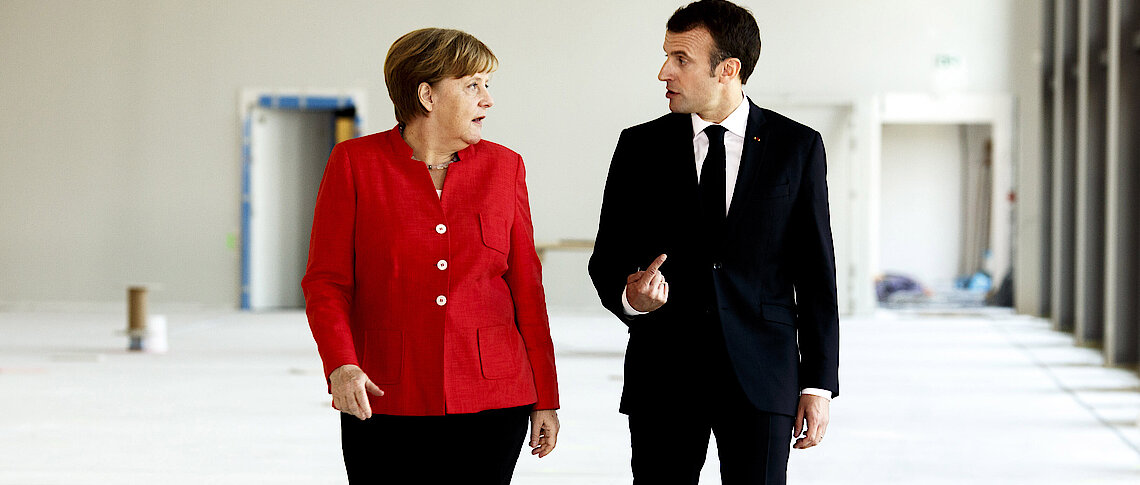Read this article in German or Russian.
One year ago, Emmanuel Macron was elected president of France on his ambitious programme of reforms. He pledged to overhaul the French economy and welfare system, and promised major changes to the EU’s defence, monetary and migration policies.
While his structural domestic reforms are in full swing in France, Macron hasn’t had any luck with his European campaign promises. Not only because of the unusually long time it took to form a government in Berlin, but also because German politicians are still very much stuck in their classical way of thinking.
Yet, there is a serious commitment to Franco-German relations in both countries. In January, to mark the 55th anniversary of the Elysée Treaty of friendship between the two nations, MPs from France and Germany took part in debates in the other country’s parliament for the first time. Macron’s push for a new Elysée Treaty is being pursued with such tremendous dedication in Berlin that neighbourly relations formed a core part of the German coalition agreement.
But even if German support for a French president has rarely been as great as it is today, Macron’s plans for Europe have met resistance in large parts of the German government and wider society.
Macron is after all someone who everyone can project their own ideas onto. Politicians and the public alike can pick and choose the best parts they like about him while ignoring the rest.
Compared to all that’s happening at the domestic level, very little is happening with the EU reforms Macron had in mind.
For Europhiles, soundbites from his 2017 Sorbonne speech on the future of Europe suggested that he strives for greater idealism and a little pathos in European debates.
Just a few months after being elected, the French president won the Charlemagne Prize for his ‘powerful vision of a new Europe’. For social democrats and greens, this conjured up the impression of a grassroots movement, as epitomised by ‘En Marche!’ They were equally enthusiastic about his idea to launch a citizens’ consultation on the future of Europe across the various member countries.
Liberals and conservatives, on the other hand, value his plans for internal reform. Germany has long called for the structural reforms recommended by the European Commission to be implemented. Macron’s aim to limit migration to Europe is also popular amongst them.
Reforms on two fronts
Macron has made no secret of his ambitious plans for France. Whether it’s employment law, fiscal policy, the education system or unemployment benefits, not a single aspect of the French welfare state is off-limits.
In September 2017, just a few months after the French presidential election, his reforms to the job market were made law, loosening dismissal protections while strengthening corporate and industry agreements.
In terms of fiscal policy, he reduced employees’ contributions and increased the general social contribution, to the annoyance of old-age pensioners.
Some feats Macron hasn’t been able to cross off his to-do list. Changes to the state-owned railway operator SNCF, which hasn’t been reformed for years, have not yet taken effect, and proposals to overhaul education and unemployment benefits also remain on the agenda.
Compared to all that’s happening at the domestic level, very little is happening with the EU reforms Macron had in mind. Sure, there are some bright spots. The ‘posted workers’ directive – a key issue in the Franco-EU debate – is being revised and the 27 member states have agreed on a Permanent Structured Cooperation (PESCO) on defence policy.
While Macron may well have won the election on his pro-EU policies, the French presidential election was still marked by a profound Eurosceptic sentiment.
But Macron has made little progress on his pursuit of a ‘sovereign Europe’ and on matters such the eurozone budget, a common EU asylum authority and an EU public prosecutor office to help in the fight against terrorism.
A close link
The stalemate in Europe is a problem for the French president, in so far as domestic and EU reforms cannot be separated. The success of one depends on the other.
On the one hand, structural domestic reforms should show how serious the government is and restore France’s credibility on the European stage, not least with Germany. Paris wants to portray itself as a reliable partner that sticks to its word and in turn has a legitimate claim to a leading role within the EU.
On the other hand, reforms at the EU level should make national reforms easier. The resistance to the overhauls to the French welfare state can partly be explained by the fact that the reforms are not seen as being driven by France. Instead, a part of the French see them as being imposed from the outside by the EU.
While Macron may well have won the election on his pro-EU policies, the French presidential election was still marked by a profound Eurosceptic sentiment.
It’s why the French people will only accept reforms if they believe they are for the good of their country’s future – not because the EU says so – and provided that the EU’s focus is on protecting and improving living conditions, not on liberalising and weakening the welfare state. It explains the call Macron has repeatedly made for ‘a Europe that protects’.
A friendship under pressure
Politicians in Berlin aren’t always clear on the risk Macron is running with his change agenda. Support in France for his social and economic reforms is weak. His approval ratings have been falling since the beginning of the year, while strikes have grown. The president has pressed ahead anyway, without offering any concessions to unions or protesters.
Critics of Macron’s EU reforms must also outline their proposals for the future of Europe and explain how they want to dig Europe out of the hole it is in.
More and more people in France fear that Macron’s reforms will undermine social cohesion and sow greater divisions in society. They accuse him of catering to the wealthy and destabilising middle to low-income households with his policies.
Unpopular reforms need to be justified with quick results, both at the European and global level. Macron’s popularity, even at the beginning of his presidency, is built mostly on his conduct as a head of state and diplomat. But what if it turns out that, he can’t deliver the desired results?
With a 0.7 per cent growth of the economy and an unemployment rate that dropped to 8.9 per cent in the final quarter of 2017 as well as a reduction in the EU budget deficit for the first time in 10 years, Macron can breathe a sigh of relief for now, albeit a modest one. A large number of French people after all haven’t quite noticed the upturn.
For his plans to reform the EU, Macron is resting on the cooperation of the German government. In a Europe gripped by tension, Germany is not only its preferred but the only possible partner, especially after the Italian elections propelled anti-establishment parties to the fore.
While Macron is playing a risky game with his political change agenda, Germany is hardly budging at all. Of course, not every single idea will go down well. It’s quite normal and even good for France and Germany to differ in their opinions, as this can contribute towards constructive discussions.
But red lines and outright rejections won’t bring solutions any closer. Critics of Macron’s EU reforms must also outline their proposals for the future of Europe and explain how they want to dig Europe out of the hole it is in.
It’s not a matter of deciding whether to veto or whether to walk; it’s about compromising. That’s what good friends do after all.







